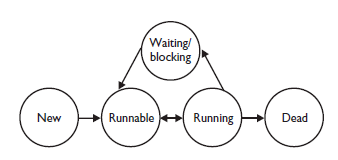New
This is the state the thread is in after the Thread instance has been created, but the start() method has not been invoked on the thread. It is a live Thread object, but not yet a thread of execution. At this point, the thread is considered not alive.
Runnable
This is the state a thread is in when it’s eligible to run, but the scheduler has not selected it to be the running thread. A thread first enters the runnable state when the start() method is invoked, but a thread can also return to the runnable state after either running or coming back from a blocked, waiting, or sleeping state. When the thread is in the runnable state, it is considered alive.
Running
This is the state a thread is in when the thread scheduler selects it (from the runnable pool) to be the currently executing process. A thread can transition out of a running state for several reasons, there are several ways to get to the runnable state, but only one way to get to the running state: the scheduler chooses a thread from the runnable pool.
Waiting/blocked/sleeping
This is the state a thread is in when it’s not eligible to run.the thread is still alive, but is currently not eligible to run. In other words, it is not runnable, but it might return to a runnable state later if a particular event occurs. A thread may beblocked waiting for a resource (like I/O or an object’s lock), in which case the event that sends it back to runnable is the availability of the resource—for example, if data comes in through the input stream the thread code is reading from, or if the object’s lock suddenly becomes available. A thread may be sleeping because the thread’s run code tells it to sleep for some period of time, in which case the event that sends it back to runnable is that it wakes up because its sleep time has expired. Or the thread may be waiting, because the thread’s run code causes it to wait, in which case the event that sends it back to runnable is that another thread sends a notification that it may no longer be necessary for the thread to wait.The important point is that one thread does not tell another thread to block. Some methods may look like they tell another thread to block, but they don’t. If you have a reference t to another thread, you can write something like this:
t.sleep(); or t.yield()
But those are actually static methods of the Thread class—they don’t affect the instance t; instead they are defined to always affect the thread that’s currently executing.Note also that a thread in a blocked state is still considered to be alive.
